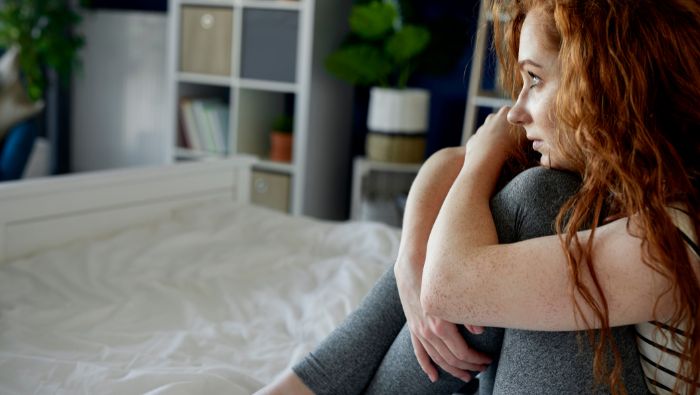Why Is Anxiety So Common Now?
Anxiety is a feeling of unease, nervousness and fear that affects millions of people around the world.
Research suggests that it has been steadily increasing over the past few decades, leading to questions about why this is so.
There are many factors that can contribute to anxiety disorders such as genetics, environment, lifestyle choices and medical conditions.
Mental health problems such as depression can also be linked to increased levels of anxiety.
In addition, social media may play a role in contributing to feelings of anxiousness by creating unrealistic expectations or self-comparisons with others.
It’s important for those who experience anxiety to seek professional help in order to manage their symptoms effectively.
With proper treatment and support from friends and family members, individuals can better understand the causes of their anxiety and develop coping strategies for managing it on their own terms.
Why Do So Many People Have Anxiety?
It’s hard to ignore the fact that anxiety is a very common mental health issue.
It affects nearly 20% of adults in the United States, with an even higher rate among young people and teens.
So why do so many people have anxiety?
The answer may be found in a combination of factors including lifestyle, genetics, and environmental stressors.
It’s possible that certain lifestyles can lead to increased levels of stress and anxiety.
Many people with high-pressure jobs or stressful family lives struggle with chronic worry and fear due to the consistent pressures they face on a daily basis.
Additionally, those who are prone to perfectionism or have difficulty managing time are more likely to experience anxious feelings than those without these issues.
Genetics also play a role in how susceptible someone is to experiencing anxious thoughts or feelings.
Why Is Anxiety So Common?
Anxiety is an incredibly common mental health issue that affects millions of people around the world.
It can be difficult to understand why anxiety has become so widespread, but there are several factors at play.
The most common cause of anxiety is stress, which can result from both external sources like work or family life, as well as internal sources such as feeling overwhelmed or having negative thoughts about oneself.
Additionally, traumatic events like accidents or serious illnesses may trigger long-term feelings of fear and worry.
People who have a family history of anxiety disorders are also more likely to experience symptoms themselves.
Why Is Anxiety More Common In Females?
Anxiety is a mental health disorder that is experienced by people of all ages, races, and genders.
However, research suggests that anxiety disorders are more common in females than males.
According to recent studies, women are twice as likely as men to be diagnosed with an anxiety disorder.
It is believed that there are many potential factors contributing to why this gender discrepancy exists.
One factor could be the increased stressors women face due to their roles in society.
Women often have greater responsibility for family duties and caretaking than men do which can lead to higher levels of stress and worry about life events.
Additionally, some studies suggest that biological differences may also contribute to the difference in anxiety levels between genders- hormones such as serotonin and cortisol have been linked with anxiety symptoms in both men and women but may affect women differently than men.
Is Anxiety More Common In Males Or Females?
Anxiety can be a serious mental health issue, affecting more people than many realize.
But is anxiety more common in males or females?
Recent research has shown that both sexes are equally likely to experience anxiety, however there may be some differences when it comes to the types of anxiety experienced.
Studies suggest that women may be more likely to suffer from generalized forms of anxiety such as social or general phobias and panic disorders, while men are at higher risk of developing specific phobias, such as fear of spiders or heights.
Additionally, men appear to have a greater tendency towards avoidance behaviors associated with their anxieties compared to women.
It is also thought that due to cultural differences between genders, men may also suffer from higher levels of stress-related anxiety due their roles in society which can cause them to feel more pressure and expectations than women do.
Why Is Anxiety So Common In Young Adults?
Anxiety is an all-too-common experience among young adults.
It can manifest in a variety of ways, such as feelings of apprehension and worry, physical symptoms like stomachaches and headaches, or changes in behavior including avoiding social situations.
Anxiety is especially prevalent among college students who are faced with the pressures of academic performance and navigating their future paths.
It’s not uncommon for young adults to struggle with anxiety due to the many transitions they go through during this period of life.
From leaving home to live independently at college or university, to taking on career responsibilities and forming new relationships, these changes can take a toll on mental health.
Stressful events such as exams or job interviews can also trigger anxious thoughts and behaviors.
The good news is that there are strategies available for managing anxiety symptoms during this challenging time in life.
How Common Is Anxiety?
Anxiety is a common mental health issue that affects millions of people around the world.
According to the World Health Organization (WHO), an estimated 264 million people of all ages suffer from anxiety disorders.
In addition, nearly one-third of adults in the United States experience anxiety-related symptoms at least once in their lifetime.
Though anxiety can affect anyone, regardless of age and gender, it usually begins during teenage years or young adulthood and is more common among women than men.
Moreover, research suggests that certain life events such as extreme stress or traumatic experiences may also increase risk for developing an anxiety disorder.
Individuals with an anxiety disorder often experience severe emotional distress, physical discomfort and difficulty carrying out daily activities.
It is essential for anyone struggling with persistent feelings of fear or worry to seek help from a mental health professional to ensure proper diagnosis and treatment.
How Much Has Anxiety Increased Since Covid?
Anxiety is an emotion that has been increasing rapidly since the onset of the COVID-19 pandemic.
During this unprecedented time, it is important to understand how much anxiety has risen and what can be done to help those affected.
Since the start of COVID-19, anxiety levels have increased dramatically as people cope with uncertainty, fear of contracting the virus, and worries about finances.
According to a survey conducted by the American Psychological Association (APA), over 40% of Americans reported feeling more anxious than before due to the pandemic.
Additionally, almost 75% reported feeling aggravated or angry while nearly 70% felt worried or uneasy.
Furthermore, various mental health organizations from around the world have noted that individuals are experiencing a range of emotions such as depression, loneliness, stress and fear which all contribute to higher levels of anxiety.
What Causes Anxiety?
Anxiety is a mental health disorder characterized by persistent worry, fear and unease in response to perceived or real threats.
It is the most common psychiatric condition in the US, affecting 40 million adults aged 18 and older.
Understanding what causes anxiety can help those struggling find effective treatments to manage their symptoms.
The exact cause of anxiety is unknown but it has been hypothesized that genetics, environmental factors and lifestyle choices may all play a role in its development.
Evidence suggests that genes can contribute to an increased risk of developing an anxiety disorder while environmental factors such as trauma or prolonged stress can lead to changes in the brain which increase vulnerability to this condition.
Additionally, lifestyle choices such as diet, physical activity level and sleep patterns are known to be important for maintaining good mental health; disruptions in these behaviors may increase risk for developing anxiety symptoms.
Why Is Social Anxiety More Common Now?
Social anxiety is a mental health issue that has become increasingly common in recent years.
More and more people are being affected by the condition, which can make everyday activities like going to school, work, or social events difficult and uncomfortable.
The question remains: why is social anxiety becoming so much more prevalent?
In order to answer this question, it’s important to look at the cultural environment of today.
Social media makes it easier for us to compare ourselves to others, as well as take part in conversations without having to face-to-face interactions.
This can lead many people feeling inadequate or judged on their physical appearance or personal beliefs.
Additionally, our culture continues to put an emphasis on individual success instead of community connection or collective outcomes – creating feelings of isolation among those who don’t succeed in their chosen roles or path in life.
Why Am I More Anxious Than Normal?
Anxiety is a natural emotion that everyone experiences from time to time.
But, when your anxiety begins to interfere with your everyday life, it may be a sign of something more serious.
If you’ve been feeling persistently anxious for a while now and don’t know why, here are a few possible explanations as to why you might be feeling this way.
Feeling overwhelmed by circumstances in your life such as school, work or relationships can lead to heightened levels of anxiety.
Taking on too many responsibilities or facing difficult challenges can make it hard for you to cope.
If these feelings aren’t addressed properly, they can start to take over and cause even more stress and worry than usual.
It’s also important to consider mental health conditions that have symptoms which could contribute to increased anxiety levels such as depression or panic disorder.
Why Is Anxiety And Depression More Common Now?
It is no surprise that anxiety and depression have become more common nowadays.
With the added pressures of work, family, and other obligations, it is not uncommon for people to feel overwhelmed and highly stressed.
In addition to this, social media has created an entirely new realm of comparison and judgement which can further exacerbate feelings of inadequacy and insecurity.
Anxiety and depression are two very real mental health issues that cannot be ignored any longer.
Symptoms such as feeling hopeless or helpless; low self-esteem; difficulty sleeping; unexplained physical pains; difficulty concentrating or making decisions; fatigue; loss of appetite or increased cravings for food – these are all signs that one may be suffering from either anxiety or depression.
It is important to seek help when these symptoms arise as they can lead to more serious problems if left unaddressed.
Why Is Anxiety More Common In America?
Anxiety is a mental health disorder affecting millions of Americans every year.
It can manifest in feelings of worry, restlessness, fatigue, and difficulty concentrating.
As such, it has become an increasingly common issue in the United States today.
The reasons why anxiety is so prevalent vary from person to person but experts have identified several factors that may contribute to its rise.
One major factor is the increase in stress levels caused by modern life.
With constant exposure to media and technology on a daily basis, people are more overwhelmed and anxious than ever before.
Stressful work environments can also cause or exacerbate anxiety since many jobs require employees to work long hours with little down time for relaxation or self-care.
Why Does Everyone Have Anxiety All Of A Sudden?
In recent years, anxiety has become a huge part of our lives.
Everyone from children to adults is feeling the effects of stress and worry, often leading to an overall feeling of anxiousness.
But why does it feel like everyone has anxiety all of a sudden?
Anxiety can be caused by many different factors – from genetics to environmental influences or even just daily life stressors.
It can also be triggered by traumatic events such as death or illness in the family or even just difficult life changes like starting a new job or moving house.
Whatever the cause may be, it’s important to recognize that anxiety is on the rise and that people need help managing their mental health now more than ever before.
Coping techniques are key when it comes to managing one’s anxiety.
Is Anxiety Becoming An Epidemic?
Anxiety is a normal emotion that everyone experiences from time to time, but for some people it can become an all-consuming issue.
The World Health Organization (WHO) estimates that 264 million people around the world suffer from anxiety disorders, and some experts believe this number is increasing. Is anxiety becoming an epidemic?
The way we live today might be part of the problem. Many of us now have busy lives filled with high expectations.
We’re expected to balance work and family life, as well as maintain a healthy lifestyle, all at once.
This puts a lot of pressure on us and can increase our stress levels and lead to mental health issues such as anxiety.
We are also exposed to more information than ever before due to technology like social media, news outlets, etc.
Is Anxiety Getting Worse?
It’s a question that has been on the minds of many in recent years: is anxiety getting worse?
Recent studies have suggested that there has been a rise in anxiety related issues, but what could be causing this change?
Mental health experts and researchers are beginning to look more closely at the issue.
There are a number of factors that may have contributed to an increase in anxiety levels, including the rise of social media, lifestyle changes, and economic uncertainty.
Social media often creates unrealistic comparisons or expectations with which many people find it difficult to cope.
Additionally, our increasingly busy lifestyles can leave us feeling overwhelmed and unable to relax properly. Finally, economic instability can lead to feelings of stress and worry about our future prospects.
You may also enjoy…
How Meditation Helps With Anxiety?
Does Yoga Improve Mental Health?
Rumination: Why Do People Obsess Over Things?
Signs You Need Therapy For Anxiety








